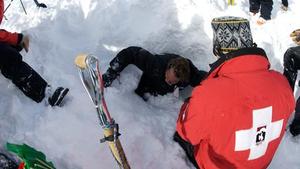Search and rescueApp helps save people trapped by avalanche
For the person buried under the weight of an avalanche, each minute is precious. A person saved from the snow mass within fifteen minutes has a 90 percent chance of survival. After forty-five minutes that chance has diminished considerably. Researchers develop an app that makes it possible for skiers with smartphones to find people buried in the snow.

The app turns every skier into a search-and-rescue operator // Source: vietvideos.vn
Save your friend who is buried in an avalanche while waiting for the rescue team to arrive. An app developed at KTH Royal Institute of Technology, makes it possible for skiers with smartphones to find people buried in the snow.
For the person buried under the weight of an avalanche, each minute is precious. A person saved from the snow mass within fifteen minutes has a 90 percent chance of survival. After forty-five minutes that chance has diminished considerably.
It may make the difference between life and death if the skiers themselves can find an avalanche victim, before the rescue team has arrived. This is also the reason that the off-piste skiers take with them special avalanche equipment, but such equipment may be both costly and difficult to deploy in the circumstances.
“Far too many people die in avalanches each year. At the same time, more and more people have smart phones on them. Through this app we are developing, the person that has such a phone can simply carry a transceiver,” says Petter Wirfält, Doctor in Signal Processing at KTH Royal Institute of Technology.
A KTH release reports that what is required is that the skiers have the application installed and have a smart phone with them; this applies both to those who are searching and whoever is trapped by the avalanche. The idea is that the application shall be an easily accessible and easily used complement to already existing avalanche rescue kits.
“All skiers, including winter sports enthusiasts and families with children on winter holiday trips, will be able to use the app,” says Björn Ottersten, Professor of Signal Processing at KTH.
The injured can be sought and detected through a single skier activating the app. It shall become active through pressing a button. The search now begins and the technology relies on wireless communication in the form of a transceiver in the phones of whoever is searching and the avalanche victim.
The positioning process operates more quickly when several people are searching at the same time, since phones in the vicinity can exchange information. Each phone creates its own picture of where the avalanche victim is to be found and the system can then bring together information from several different angles. This makes it possible to locate the person or persons among the mass of snow. The system can provide clear instructions, all the time, to guide rescuers to the victim or victims.
Technical tests on the device are now in progress and a prototype has delivered promising results so far.
The project is funded partly by the EU, through financial support from the European Research Council (ERC). It is also backed by KTH Innovation.
Besides Wirfält and Ottersten, Professor Peter Händel, Research Leader at the KTH Signal Processing Lab, also stands behind the research project.
“We have long been working with interactive positioning systems for rescue teams and firemen. We are now taking the step to consumer applications,” says Peter Händel.
The technology can have further areas of application for locating persons who have got lost in the vicinity. It could be children who have got separated from their parents in a skiing facility or even persons who have become separated from one another in a large shopping center.
